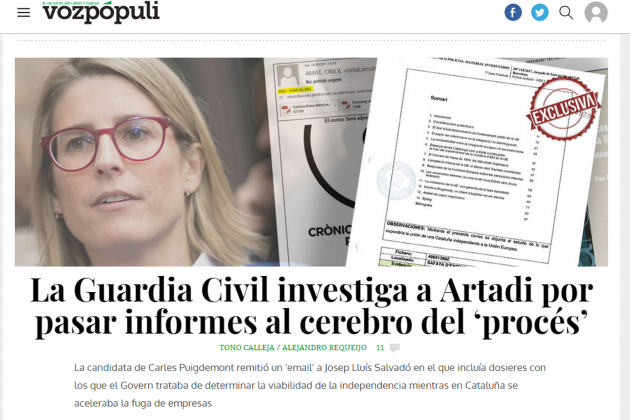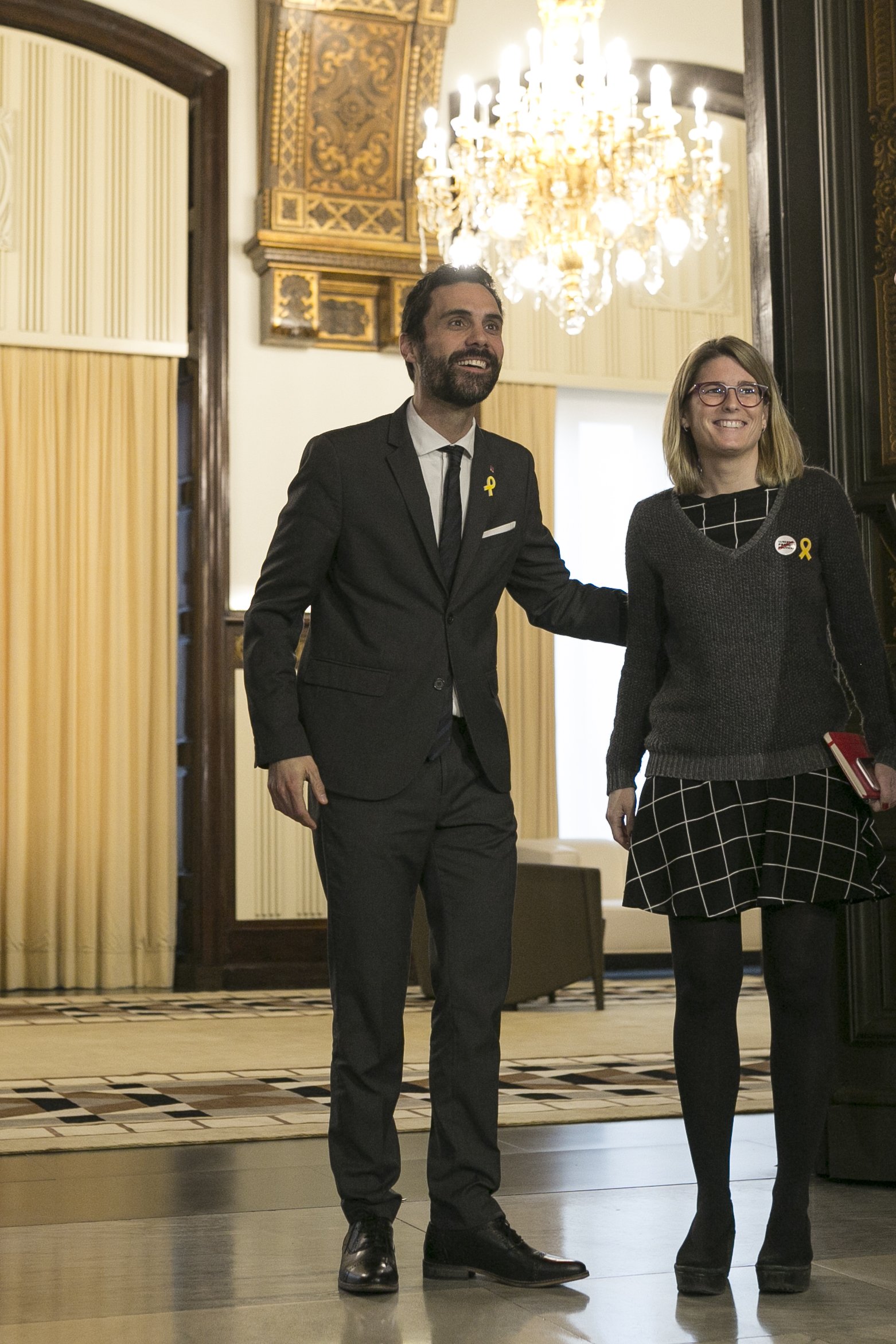The list of Catalan independence leaders who are in the sights of Spain's government, its justice system and its establishment media, does not stop growing. The latest two candidates to be targeted are two actors on the Catalan political stage who are expected to be protagonists in the action now unfolding: Elsa Artadi, representative for JuntsxCat (Together for Catalonia) along with the newly-appointed speaker of the Catalan Parliament, Roger Torrent of ERC (Catalan Republican Left).
The name of Elsa Artadi, right-hand woman to Carles Puigdemont, has been on the table since election night on 21st December as a possible presidential candidate if the investiture of the exiled Puigdemont were to become definitively nonviable. Artadi is not the only option for the JuntsxCat group and even less so for the PDeCAT (Catalan European Democratic Party), but unlike other names such as those of Jordi Sànchez and Jordi Turull, she has not been under investigation for cases related to the independence referendum of 1st October and the declaration of the Catalan republic. At least, not until now.
As for Torrent, his role becomes more important every day, on the one hand due to the institutional position he occupies in a period of extreme complexity - in practice, he is right now the only “effective president”- and on the other hand, because the operational leadership of ERC has been badly shaken, by the imprisonment of party leader Oriol Junqueras, by secretary general Marta Rovira's apparent step out of the limelight, and by former minister Carles Mundó's return to civil society.
In the last few hours, the political and mediatic focus has directly targeted Artadi and Torrent. Puigdemont's campaign manager has been the cover photo of newspapers in both Madrid and Barcelona, presenting her as the most likely pragmatic option to take over from the exiled Catalan president in Brussels. But there are also attempts to criminalize her through emails which she allegedly sent as the director general of interdepartmental coordination in the Catalan government to the secretary general of the Vice-Presidency and the Economics and Treasury department, Lluís Salvadó - one of the senior civil servants arrested in relation to the events of 1st October.

The digital newspaper Vozpópuli pointed the finger at Artadi on Friday with a high-impact headline: “Civil Guard investigates Elsa Artadi for sending reports to the brain of the independence process”. The ‘brain’ is Salvadó, member of ERC and right-hand man of vice president Junqueras, at present released on bail in the case being heard by Judge Juan Antonio Ramírez in court number 13 of Barcelona. The “economic reports” are, on the one hand, the study “The Economy of Catalonia” - which can be accessed online in English -, a collection of essays published by the Catalan Association of Economists, written by prestigious academics; and, on the other, a study made by the Catalan government entitled “Chronicle of a premeditated offensive: the consequences for the people of Catalonia”, discussing the asphyxia through economic pressure and restrictions on action applied to the Catalan government by Spanish governments over the last decade. The latter report was studied by the Catalan executive on 30th June 2015, during the presidency of Artur Mas, and can also be downloaded in English from the Catalan government's website.
There are, then, two public documents which the Civil Guard along with the mentioned newspaper are presenting as incriminatory evidence against the JuntsxCat deputy. It is presumed that Artadi sent an email to Salvadó on 19th September 2017, a day before the Civil Guard carried out its "Operation Anubis" against the headquarters of the Catalan Ministry of the Economy and other government departments. That operation led to 15 arrests and massive popular and peaceful protests for which Jordi Sànchez and Jordi Cuixart, leaders of the ANC and Òmnium civil groups respectively, were sent to prison.
Artadi's email was a forwarded message sent to her by Oriol Amat, Junts pel Sí deputy and economics professor, one of the authors of the economic report, and was labelled “urgent request”. During the search of the Ministry of the Economy, the Civil Guard confiscated Salvadó's email, and this has been used by the Spanish paramilitary body to draft a list of 32 people “of interest to the investigation”, among whom is Artadi.
Elsa Artadi, who is a qualified economist with a doctorate from Harvard University and a former activist for the PDeCAT, continued in her director general role after Spain's application of Article 155, and was to some extent looked on favourably in Spanish government circles. But she was also the campaign manager who led Puigdemont to electoral success, thus returning the independence block to its absolute majority in parliament, and now she may succeed her boss, at least in terms of the “effective” presidency of Catalonia.
The declaration of Forcadell
Meanwhile, the name of Roger Torrent, the speaker of the Catalan Parliament, has also been signalled in the last day, in the context of the leaking of the testimony that former Catalan speaker Carme Forcadell gave before Supreme Court judge Pablo Llarena. News reports have presented Forcadell's testimony, the latest of a whole series of selective and directed leaks of the courtroom statements of the pro-independence leaders, as an attempt by Forcadell to evade her responsibilities. And specifically, to blame her successor - Torrent - in relation to the declaration of Catalan independence made on 27th October.
Forcadell replies affirmatively when the public prosecutor asks her if she read the declaration at the request of Torrent, who was then a spokesperson for the Junts pel Sí group. “Did Mr. Torrent, Roger Torrent, asked you to do it?", the prosecutor asks. “Yes, your honour”, she replies. What most of the news reports on the matter give much less emphasis to is that when the prosecutor asks her if she read it because of its great importance, Forcadell replies that it “was a request like those I have had on many other occasions”. That is, that she read it for reasons unrelated to the person who requested it and in order to comply with her institutional duty.
Torrent has not been prosecuted, making him - like Artadi - in the eyes of the Spanish executive, a “clean” pro-independence candidate of the type that the Popular Party are looking for to occupy the highest institutional posts in a hypothetical “normalized” post-155 Catalonia. This does not mean, however, that the judicial sword of Damocles does not hang over him. The proof of this is in his decision to suspend the presidential investiture of Carles Puigdemont on 30th January after the “preventive” resolution of the Constitutional Court had forbidden the (re)appointment at a distance of the president or, even his appointment in person, unless he could obtain judicial permission. From that point onwards, the man who is the second-highest authority in the Catalan government - and, at the moment, the highest ranking in “effective” terms - has at all times avoided taking any legal misstep that could set him on the path of his predecessor Forcadell, even at the price of allowing the investiture process to keep ticking over in neutral gear.

